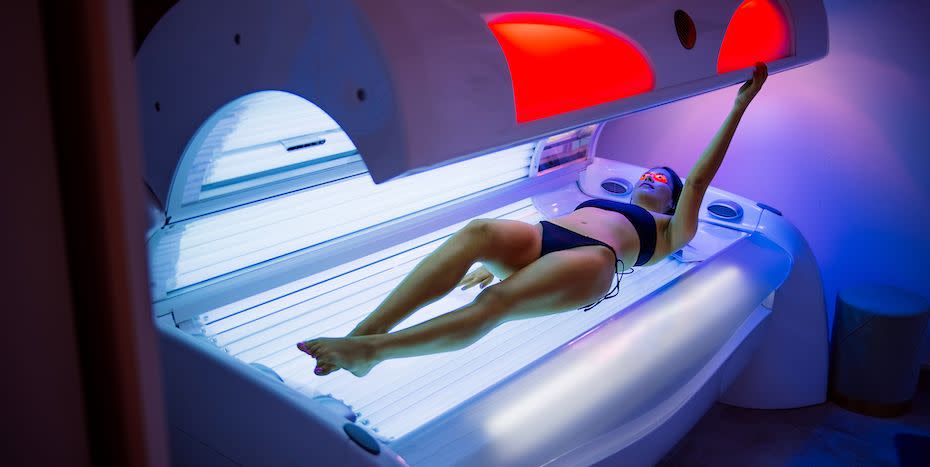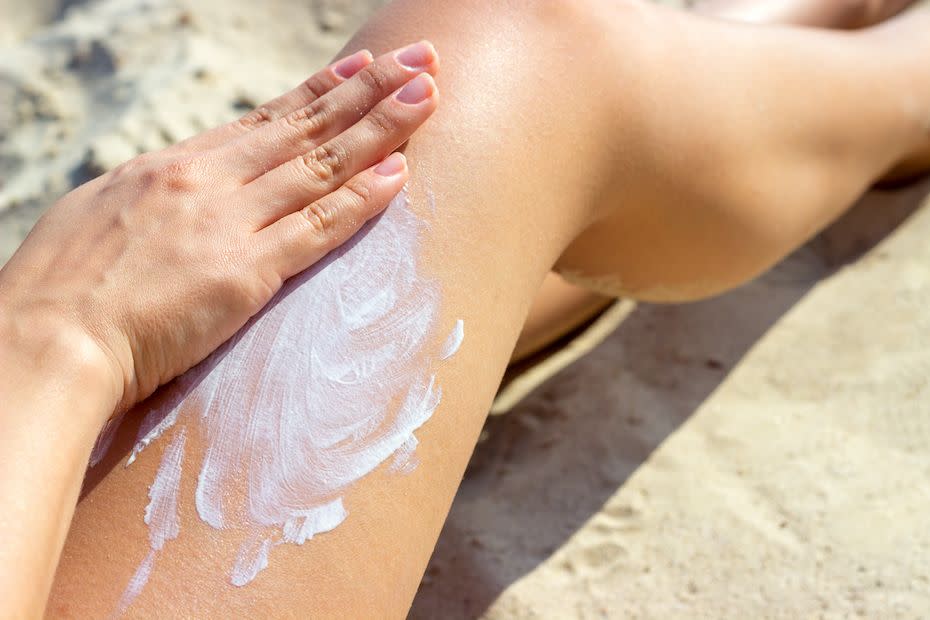Woman’s 'saltwater spray' sunbed hack goes viral, concerning doctors

A woman is going viral on TikTok over her sunbed hack, prompting doctors to share their concerns.
Influencer Bethany Rowe shared the TikTok earlier this month and it has since racked up over 1.5 million views. "If you go on sunbeds I recommend trying this," she wrote in the caption, alongside a TikTok that showed her spraying a saltwater solution on her body while using a tanning bed.
Although there were plenty of comments from TikTokers keen to try the hack on their next trip to the tanning salon, others were concerned about how dangerous it could be. "This seems really dangerous," one person commented, with another person writing: "Will dry and kill your skin."
There were also several comments from users whose relatives had been diagnosed with skin cancer as a result of using sunbeds. "Dad died from skin cancer. Tanning beds are the worst!" one person said in response to the video, as another commented: "My mom got cancer because of these."
According to Cancer Research UK, using sunbeds can increase your risk of melanoma skin cancer by up to 20%. And the risks are even bigger for younger people, with the NHS noting that people who are frequently exposed to UV rays before the age of 25 are at greater risk of developing skin cancer later in life.
So what are the risks associated with using sunbeds? And how can these be made even worse by drenching your skin in a saltwater spray? We spoke to Dr Adam Friedmann, consultant dermatologist at Stratum Clinics, and Dr Abha Gulati, consultant dermatologist at The Harley Street Dermatology Clinic, to find out more about sunbed risks.
Sunbed risks and saltwater sprays
"Sunbeds give out ultraviolet rays that increase your risk of developing skin cancer," explains Dr Friedmann, adding that the UVA radiation from a sunbed "is up to three times more intense than the UVA in natural sunlight."
"Sunbeds are a significant risk factor in skin cancer," Dr Friedmann stresses, pointing out that: "The majority of young patients under 30 [that] I see with melanoma have been sunbed users at some stage of their lives."
Commenting on the effectiveness of using a saltwater spray to 'enhance' a tan, Dr Gulati says that this will not increase how quickly you'll tan, but it "may dry the skin if it is absorbed."
However, Dr Gulati notes that you may get more of a tan on holiday if you spend a lot of time in the sea or in the swimming pool because UV rays reflect off the water.
What are some safer alternatives to sunbeds?
"Tanning is not something dermatologists would ever recommend," Dr Friedmann tells us, explaining that there's only so much your body can actually withstand when it comes to the sun.
"The Fitzpatrick scale classifies skin colour and its ability to tan into six skin types ranging from type 1 skin (fair skinned, blonde/red headed) to type 6 skin (Black African/Caribbean skin)," Dr Friedmann notes. "Those at the lower end with pale skin will only ever burn or tan minimally, however, those people with darker skin at the mid or higher end of the scale have a natural ability to produce melanin and tan easily."
To that end, "if you have pale skin, you cannot tan beyond a certain point, however long you stay in the sun," Dr Friedmann adds. "The skin has a tanning cut-off point when it cannot produce anymore melanin," Dr Friedmann explains. "When you reach this limit, you can tan no more and instead are just being damaged by the sun's ultraviolet rays."

Dr Friedmann continues: "You cannot change your skin type and trying to tan type 1 and 2 skin will increase your risk of skin cancer. So, don’t spend your holiday trying to change your skin type with sunbathing – it won’t happen if you’re naturally pale as there just isn’t that much melanin in the skin."
However, if you do have a skin type that tans, Dr Friedmann recommends still keeping sun safety in mind, which includes: avoiding the hottest hours of the day (between 11am and 3pm) and using a high factor sun cream that is applied regularly.
If you're still looking to add a golden glow to your skin – be it for a holiday, a big night out or just an average Friday – there are plenty of safer options to achieve this, such as instant or gradual fake tan.
This article is not intended to be a substitute for professional medical advice or diagnosis. Always seek the advice of your physician or other qualified health provider with any questions you may have regarding a medical condition.
You Might Also Like

